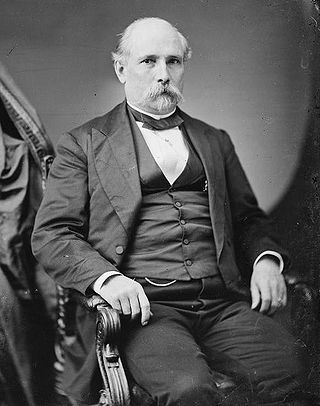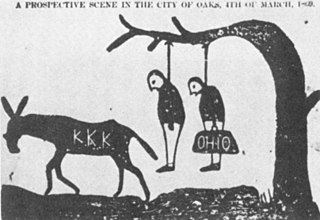
James Lusk Alcorn was a governor, and U.S. senator during the Reconstruction era in Mississippi. A Moderate Republican and Whiggish "scalawag", he engaged in a bitter rivalry with Radical Republican Adelbert Ames, who defeated him in the 1873 gubernatorial race. Alcorn was the first elected Republican governor of Mississippi.

Adelbert Ames was an American sailor, soldier, businessman and politician who served with distinction as a Union Army general during the American Civil War. A Radical Republican, he was military governor, U.S. Senator, and civilian governor in Reconstruction-era Mississippi. In 1898, he served as a United States Army general during the Spanish–American War. He was the last Republican to serve as the state governor of Mississippi until the election of Kirk Fordice, who took office in January 1992, 116 years after Ames vacated the office.

John Marshall Stone was an American politician from Mississippi. A Democrat, he served longer as governor of that state than anyone else, from 1876 to 1882 and again from 1890 to 1896. He approved a new constitution in 1890 passed by the Democratic-dominated state legislature that disfranchised most African Americans, excluding them from the political system for more than 75 years.

In United States history, scalawag was a pejorative slur referred to white Southerners who supported Reconstruction policies and efforts after the conclusion of the American Civil War.

Hiram Rhodes Revels was an American Republican politician, minister in the African Methodist Episcopal Church, and college administrator. Born free in North Carolina, he later lived and worked in Ohio, where he voted before the Civil War. Elected by the Mississippi legislature to the United States Senate as a Republican to represent Mississippi in 1870 and 1871 during the Reconstruction era, he was the first African American to serve in either house of the U.S. Congress.
Southern Democrats are members of the U.S. Democratic Party who reside in the Southern United States.

Rubel Lex Phillips was an American politician and lawyer. He grew up poor in Alcorn County, Mississippi, and graduated from the University of Mississippi School of Law. Hailing from a politically active family and initially a member of the Democratic Party, he served as a circuit court clerk from 1952 to 1956 and chaired the Mississippi Public Service Commission from 1956 to 1958. In 1962 Phillips joined the Republican Party. He ran as a Republican in the 1963 Mississippi gubernatorial election, the first person to do so since 1947. Supporting a platform of racial segregation and opposition to the presidential administration of John F. Kennedy, he lost, garnering only 38 percent of the vote.

The 1966 United States Senate elections were elections on November 8, 1966, for the United States Senate which occurred midway through the second term of President Lyndon B. Johnson. The 33 seats of Class 2 were contested in regular elections. Special elections were also held to fill vacancies. With divisions in the Democratic base over the Vietnam War, and with the traditional mid-term advantage of the party not holding the presidency, the Republicans took three Democratic seats, thereby breaking Democrats' 2/3rds supermajority. Despite Republican gains, the balance remained overwhelmingly in favor of the Democrats, who retained a 64–36 majority. Democrats were further reduced to 63–37, following the death of Robert F. Kennedy in June 1968.

The Republican Party of Louisiana(LAGOP) (French: Parti républicain de Louisiane, Spanish: Partido Republicano de Luisiana) is the affiliate of the Republican Party in the U.S. state of Louisiana. Its chair is Derek Babcock who was elected in 2024. It is currently the dominant party in the state, controlling all but one of Louisiana's six U.S. House seats, both U.S. Senate seats, all statewide executive offices, and both houses of the state legislature.

The 2004 United States elections were held on Tuesday, November 2, 2004, during the early years of the war on terror and after the 2003 invasion of Iraq. Republican President George W. Bush won re-election and Republicans retained control of Congress.
The following table indicates the party of elected officials in the U.S. state of Mississippi:

The 2000 United States elections were held on November 7, 2000. Republican governor George W. Bush of Texas defeated Democratic Vice President Al Gore of Tennessee in the presidential election. Republicans retained control of both houses of Congress, giving the party unified control of Congress and the presidency for the first time since the 1954 elections.

The Government of Mississippi is the government of the U.S. state of Mississippi. Power in Mississippi's government is distributed by the state's Constitution between the executive and legislative branches. The state's current governor is Tate Reeves. The Mississippi Legislature consists of the House of Representatives and Senate. Mississippi is one of only five states that elects its state officials in odd numbered years. Mississippi holds elections for these offices every four years in the years preceding Presidential election years.

The 2014 United States elections were held on Tuesday, November 4, 2014, in the middle of Democratic President Barack Obama's second term. A typical six-year itch midterm election suffered by most second-term presidents, this election saw the Republican Party retaining control of the House of Representatives and winning control of the Senate, while furthering their gains in the governorships and state legislatures. Because of these Republican gains, the election was commonly cited as a "red wave" election.

The 2019 Mississippi gubernatorial election took place on November 5, 2019, to choose the next governor of Mississippi. Incumbent Governor Phil Bryant was ineligible to run for a third term due to term limits. The Democratic Party nominated incumbent Attorney General Jim Hood, the only Democrat holding statewide office in Mississippi; the Republican Party nominated incumbent Lieutenant Governor Tate Reeves. In the general election, Reeves defeated Hood by a margin of 5.08%, with Reeves significantly underperforming Donald Trump, who won the state by 17 points in 2016.

The 1991 Mississippi gubernatorial election took place on November 5, 1991 to elect the Governor of Mississippi. Incumbent Democrat Ray Mabus unsuccessfully ran for reelection to a second term. This election marked the first time a Republican was elected Governor of Mississippi since Reconstruction, when Adelbert Ames won the office in 1873.

The 1968 United States presidential election in Mississippi was held on November 5, 1968. Mississippi voters chose seven electors, or representatives to the Electoral College, who voted for President and Vice-President. During the 1960s, the Civil Rights Movement dictated Mississippi's politics, with effectively the entire white population vehemently opposed to federal policies of racial desegregation and black voting rights. In 1960, the state had been narrowly captured by a slate of unpledged Democratic electors, but in 1964 universal white opposition to the Civil Rights Act and negligible black voter registration meant that white Mississippians turned almost unanimously to Republican Barry Goldwater. Goldwater's support for "constitutional government and local self-rule" meant that the absence from the ballot of "states' rights" parties or unpledged electors was unimportant. The Arizona Senator was one of only six Republicans to vote against the Civil Rights Act, and so the small electorate of Mississippi supported him almost unanimously.

United States gubernatorial elections were held on November 7, 2023, in the states of Kentucky and Mississippi, with an election having occurred in Louisiana on October 14. These elections form part of the 2023 United States elections. The last regular gubernatorial elections for all three states were in 2019.

The 2023 Mississippi gubernatorial election was held on November 7, 2023, to elect the governor of Mississippi. Incumbent Republican governor Tate Reeves won re-election to a second term, defeating Democratic nominee, Public Service Commissioner Brandon Presley.

The 1869 Mississippi gubernatorial election was held from November 30 to December 2, 1869, in order to elect the Governor of Mississippi. James L. Alcorn, Republican and moderate planter who had previously served in the Confederate Army, defeated National Union Republican Party nominee Judge Lewis Dent, the brother-in-law of President Ulysses S. Grant and former Union Army official. The Democratic Party supported Dent rather than nominating their own candidate. It was the first election following the Reconstruction era military governorship of Adelbert Ames.





















